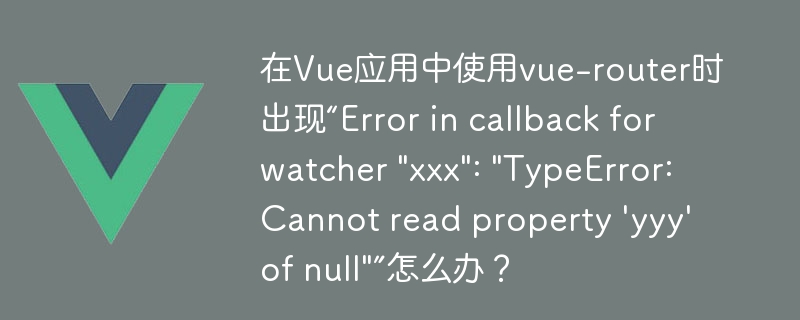Home >Web Front-end >Vue.js >What should I do if 'Error in callback for watcher 'xxx': 'TypeError: Cannot read property 'yyy' of null'' occurs when using vue-router in a Vue application?
What should I do if 'Error in callback for watcher 'xxx': 'TypeError: Cannot read property 'yyy' of null'' occurs when using vue-router in a Vue application?
- WBOYWBOYWBOYWBOYWBOYWBOYWBOYWBOYWBOYWBOYWBOYWBOYWBOriginal
- 2023-08-18 20:10:441160browse

Vue is a popular front-end framework that provides developers with powerful tools to build single-page applications (SPA) more efficiently. vue-router is Vue's official routing management plug-in, which can easily realize SPA management of page navigation. However, some bugs sometimes occur when using vue-router, the most common of which is watcher error.
Below, we will discuss the solution to the error "Error in callback for watcher xxx: TypeError: Cannot read property 'yyy' of null" when using vue-router in a Vue application.
What is a watcher error
In a Vue application, the watcher is a very useful tool. They use computed properties to track changes in data, and when the data changes, the observer automatically updates the corresponding component. However, sometimes there are some problems in the code that prevent the observer from working properly, causing errors to appear.
During page navigation, vue-router often uses observers to detect routing changes. If a problem occurs during a route change, an observer error may be triggered. A common cause of this error is trying to read data from a null value. For example:
Error in callback for watcher "route": "TypeError: Cannot read property 'name' of null"
This means that a component tried to read the "name" attribute from a null value (null), and it did not have that attribute, so an error occurred.
Modify code to avoid errors
Typically, observer errors are caused by coding errors. The most common situations are attempts to access undefined variables or components that are not loaded during page navigation.
The best way is to add some safety checks in the code to ensure that there will be no problems with the code. For example, we can use JavaScript's "optional chaining" operator to avoid reading data from null values. This is a new method introduced in the ECMAScript 2020 standard.
The following is a sample code using optional chaining:
computed: {
title() {
return this.$route?.meta?.title || 'My Application';
}
}In the above code, we use the optional chaining operator "?." to ensure that both the $route and meta objects exist . If present, their title properties are returned; otherwise, the default title "My Application" is returned.
We can also use JavaScript's conditional statements to check whether variables and components have been defined or loaded. For example:
export default {
name: 'MyComponent',
computed: {
title() {
if (this.$route && this.$route.meta && this.$route.meta.title) {
return this.$route.meta.title;
} else {
return 'My Application';
}
}
}
}In this example, we use an if statement to check whether the $route and meta objects exist, and whether their title attributes exist. If they both exist, the title attribute is returned; otherwise, the default title "My Application" is returned.
Summary
Observer errors are one of the common problems in Vue programs. When using vue-router, these errors usually mean that the component is trying to read data from an undefined variable or a component that is not loaded. We can avoid these errors by using new JavaScript features like optional chaining or conditional statements to check for the existence of variables and components. Often, modifying the code to avoid observer bugs is a better solution than trying to fix the buggy mechanism itself.
The above is the detailed content of What should I do if 'Error in callback for watcher 'xxx': 'TypeError: Cannot read property 'yyy' of null'' occurs when using vue-router in a Vue application?. For more information, please follow other related articles on the PHP Chinese website!
Related articles
See more- How to add navigation hooks similar to vue-router in Backbone routing
- Add loading prompts when lazily loading vue-router to improve user experience
- Detailed explanation of the use of routing metainformation of Vue-router
- How vue interacts with the backend
- How to solve the problem that vue-cli-service is not an internal or external command

